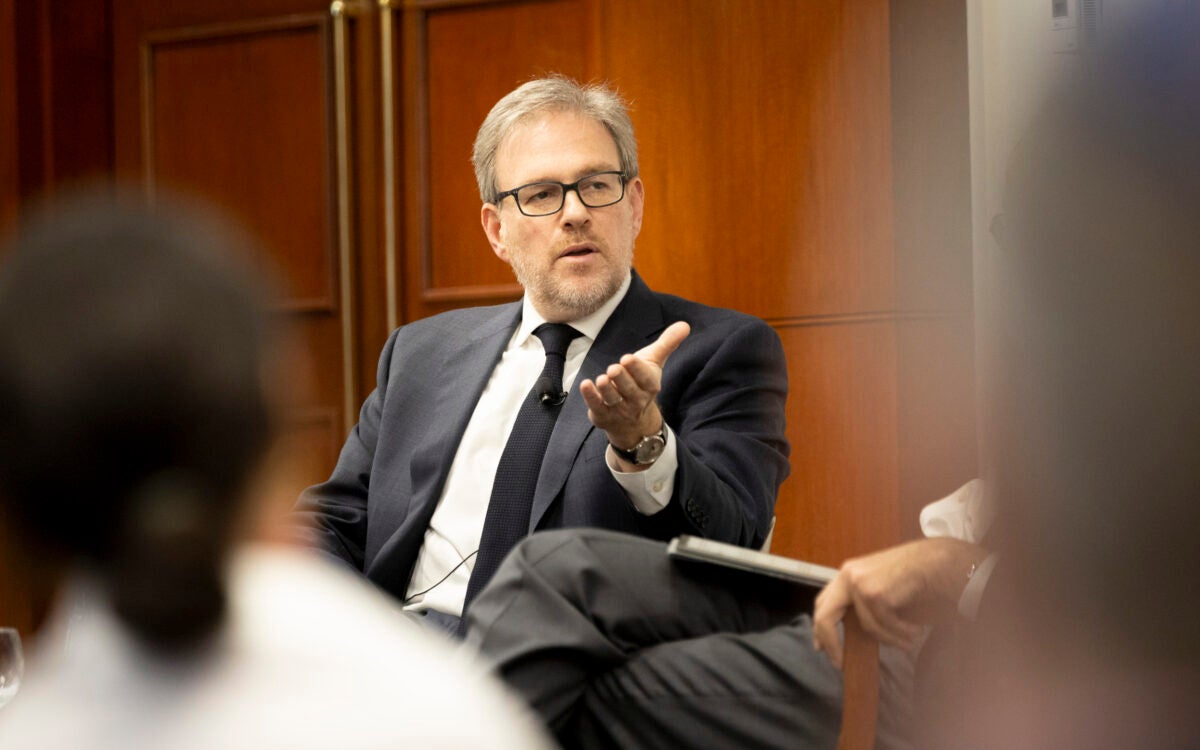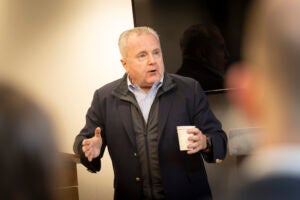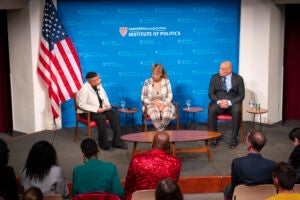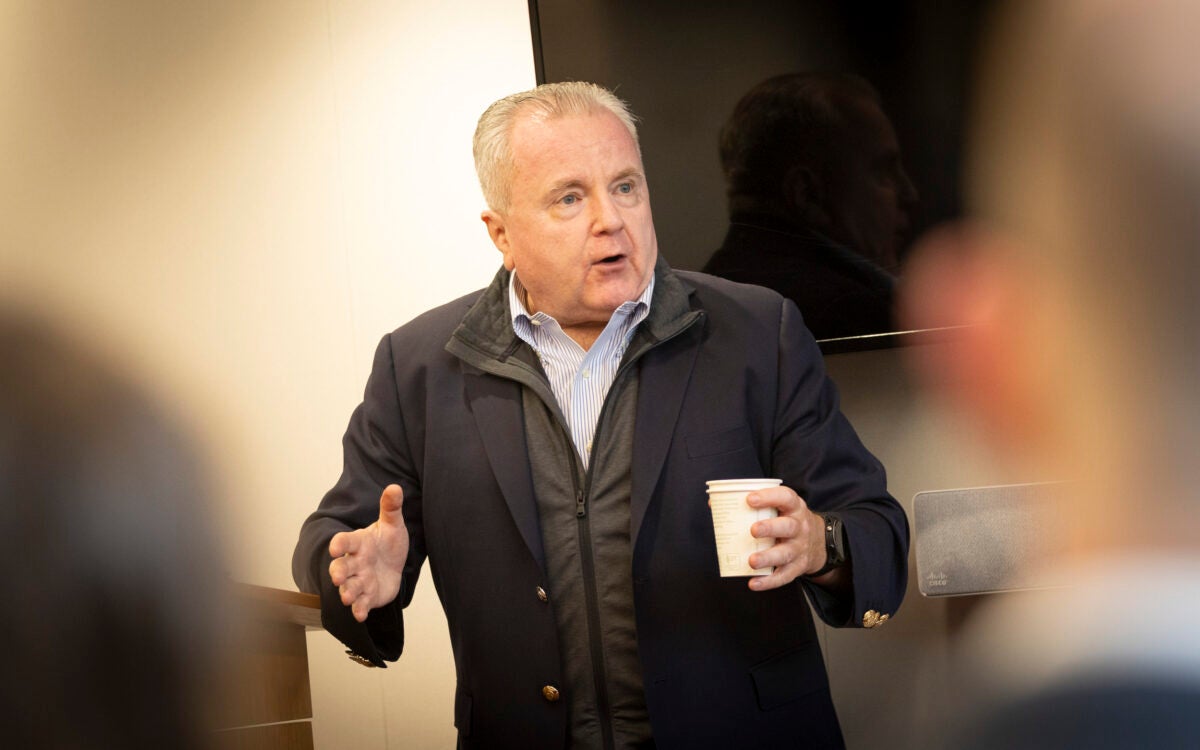A price too high
Journalist Jeffrey Goldberg reflects on the end of Middle East war correspondents, and what is lost
Before the terrorist attacks of 9/11, covering the Middle East as a journalist was, as H.L. Mencken once described news reporting, the “life of kings.” Getting paid to travel overseas, talk to interesting and even extreme people, and write about their ideas and plans was a thrilling and rewarding career for those game enough to try it.
But those days are over, says Jeffrey Goldberg, a national correspondent for The Atlantic who has written for nearly two decades about the Arab-Israeli conflict and has traveled the Middle East interviewing world figures and terrorist leaders, including members of Hezbollah, Hamas, al-Qaida, and the Taliban.
“The thing that’s really weighing on me is that something has fundamentally changed in the way that we write about jihadism,” Goldberg said during a talk Tuesday at the Shorenstein Center on Media, Politics, and Public Policy at Harvard Kennedy School (HKS).
The beheadings since August of reporters James Foley and Steven Sotloff by the Islamic State, or ISIS, represent a new and devastating chapter for the difficult work of Middle East reporting. The danger is only punctuated by this week’s execution of American aid worker Peter Kassig.
“I think a period in the history of the American journalistic encounter with the Middle East is over,” said Goldberg. “And I don’t know what’s coming next, but it doesn’t seem good.”
Goldberg said he used to happily counsel smart, young reporters — including Sotloff, whom he met several years ago in Israel — who were eager to break into Middle East reporting. Since the beheadings, he’s had a change of heart.
“Even after [Wall Street Journal reporter] Danny Pearl was murdered [in Pakistan in 2002], a lot of us, me included, thought it was the exception that proved the rule,” he said. “There was always a contract between terror organizations and journalists: I go to you, I write down accurately what you say, I carry that back to my audience. They’re happy because they believe that they’re right, and that their message is going out, and I’m happy because I get to show how appalling they are, and everything was working. ISIS changes everything.”
The growing strategic brutality of Sunni jihadists and their skillful manipulation of social media platforms means journalists are no longer useful to terrorist organizations, and are therefore at risk.
“ISIS communicates perfectly well through YouTube and Twitter and Facebook. It doesn’t need us,” said Goldberg. “Something radical has shifted in the way some of these terrible groups have seen us, and so I can’t in good conscience tell anybody to go anywhere near this conflict anymore.”
While it remains important to document what’s happening in the region, “especially after these videos,” he says, “I can’t imagine a single publisher, a single news executive, thinking it’s worth it.”
Goldberg noted the 2003 death of Michael Kelly, The Atlantic editor who was the first American journalist to be killed in action during the Iraq invasion. “That’s a trauma institutions don’t recover from so easily, so you have to ask yourself: ‘Is it really worth the story?’”
The Islamic State’s deliberate targeting of journalists in the region for kidnapping and death means the current conflict and the refugee crisis in Syria and Iraq now go “substantially uncovered” by the media. But the difficulty in getting images and information about the turmoil “doesn’t absolve” news organizations from covering the unfolding horrors, including the group’s mass abduction and enslavement of Yazidi minority women.
“I would like to see the story of Yazidi slavery on the front page and at the top of every website every day because there’s no more, in my mind, more pressing humanitarian issue in the world than this. It’s a moral impossibility in the 21st century that this is taking place and that no one is marching in to go free these women,” said Goldberg.
The graphic beheading videos have been remarkably effective in frightening people and stirring up opposition to the Islamic State, and they also inspired thousands of would-be acolytes around the world who want to join the group, said Goldberg.
“I’ve watched all of the videos, including the last one, which is the most remarkable video of all, not because of the Kassig situation, which we’ve seen, but it is a 16-minute video designed to communicate to young Sunni men that ‘your hatred for the Shia has a place. You can come to us, and we will let you fulfill your fantasy of vanquishing and annihilating the Shia.’”
As a reporter, Goldberg said he’s torn about the current media blackout of these videos.
“I know it’s now sort of conventional wisdom that we should isolate this from the world. It runs against my belief that we’re journalists and we’re about bringing information to light, no matter how horrible the information is. But as a human, however, I don’t want to see that. And as a father, I don’t want to risk the remotest possibility that one of my children will stumble on a high-definition, well-shot beheading because I don’t want that to go into their brains,” he said. “It’s complicated, because we have to know what these guys do.”
Goldberg remains skeptical of the Obama administration’s plan to “degrade and destroy” the Islamic State.
“Many of the president’s instincts are correct,” he said. But “I don’t think he actually believes that that’s possible. I don’t believe it’s possible, in part because it’s a powerful organization, and in part because it’s not really about the organization, it’s about a shape-shifting ideology that grafts itself onto groups all across the Middle East.
“ISIS is a symptom. ISIS would not exist if the Assad regime [in Syria] hadn’t done what it’s done over the past three and a half years to the Sunnis. So if you’re not going to deal with the root cause, you’re not going to get anywhere,” said Goldberg.
In many ways, Obama’s approach to the Middle East reflects the changed political and economic landscape back in the United States.
“The lesson that he derived from the Bush administration is that just because we want the Middle East to look a certain way doesn’t mean we’re going to get to have it look that way,” said Goldberg. “To his critics, that’s a formula for powerlessness and passivity. But I think you can make the plausible argument that America, especially post-Iraq, neither has the money, the knowledge, the wherewithal to try to continue going into dysfunctional Arab countries and remake them.”




